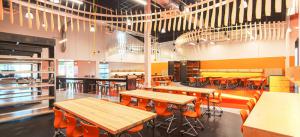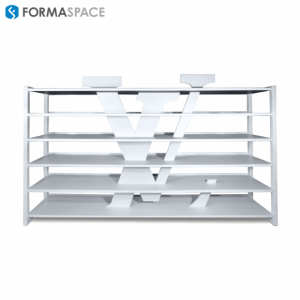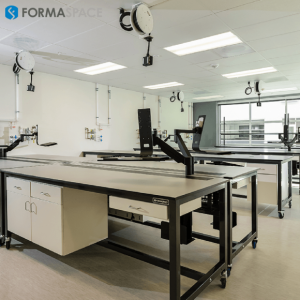Manufacturing Industry Steps In to Ramp Up Production of Medical Equipment
See how manufacturers are heeding the call to produce more PPE equipment, and clinical tests, including efforts to create a coronavirus vaccine.
There has been a worldwide scramble to secure vital personal protective equipment that are urgently needed by healthcare providers in the fight against Covid-19.”
AUSTIN, TEXAS, UNITED STATES, November 24, 2020 /EINPresswire.com/ -- We take a look at how manufacturers are heeding the call to produce more PPE equipment, hygiene products, clinical tests, and treatment therapies, including efforts to create a coronavirus vaccine.— Formaspace
Coronavirus Creates Unprecedented Demand For PPE, Including Face Masks, Face Shields, Gloves, And Protective Gowns
It’s hard to imagine this today, but, if we were to go back in time to just a few months ago, we’d find thousands if not millions of highly sought after N95 masks sitting on warehouse shelves around the world – available for purchase for as little as $.15 each.
Fast forward to the present time. There has been a worldwide scramble to secure vital personal protective equipment (including N95 masks, face shields, gloves, and protective gowns) that are urgently needed by healthcare providers, first responders, nursing home attendants, and more in the fight against Covid-19.
The current price for an N95 mask? Anywhere from $2.50 to as much as $12 a piece, possibly more.
American manufacturers of N95 masks (including 3M, Honeywell, and Kimberly-Clark) have stepped up production dramatically. 3M has pledged to raise production to 50 million per month, but this won’t be sufficient to meet demand in the short term. Over the long term, however, 3M does hope to make more than a billion masks by the end of 2020.
As demand (and asking prices) have soared, fraud has become a rampant issue. Seemingly overnight, over 1,000 new companies registered as suppliers on the FDA’s list of manufacturers, including many non-medical factories in China, until the FDA stopped sales of defective masks that didn’t work as promised. But it turns out that fraudsters don’t need a factory to try to fleece the public: US agents cracked down on two individuals in California seeking $4 million for non-existent masks.
Fortunately, there are more of us across the supply chain trying to do the right thing.
For example, the makerspace community has stepped in to share face mask designs that can be printed on 3D printers, and a virtual army of individuals working from home has taken up sewing fabric face masks.
And a new non-profit organization, Project N95 (staffed by volunteers in the healthcare products supply chain), is working to help sort out the mess created by the chaos erupting between US states and hospital systems competing against each other to source masks and other PPE.
Many non-traditional manufacturers have quickly switched their production lines over to help solve the PPE shortage.
LVMH, the French luxury product group that owns the iconic brands Dior, Fendi, Givenchy, and Louis Vuitton, has announced it will source 40 million face masks. (LVMH is a Formaspace customer.) Other well-known fashion and clothing brands, including Prada, Gucci, and Zara, have also announced they will produce face masks. Meanwhile, in the UK, the John Lewis department store reopened a factory to produce protective gowns, and the Royal Mint, better known for producing royal collectibles, has started manufacturing face shields.
Finally, we can’t overlook the outstanding contributions made by the workers at the Braskem America plant in Neal, West Virginia. The chemical factory is a key supplier of polypropylene used to make the non-woven fabric used in face masks, medical gowns, and disinfectant wipes. In just one month, the plant produced 40 million pounds of polypropylene (the equivalent needed to make half a billion N95 masks or 1.5 billion surgical masks).
How did the Braskem workers achieve this remarkable production record? They moved from home to live inside the factory so that it could operate 24 hours a day.
Race To Supply Clinical Equipment For Covid-19 Testing, Including Test Kits, Testing Reagents, And Swabs
After a rocky start dogged by defective testing kits, the US has increased the number of tests performed from a low of 2,000 in early March to around 25,000 per day currently. As of May 11, the CDC reports it has tested 6,275 specimens, and U.S. public health labs have tested 818,682 specimens. But to track and trace the virus, much more testing needs to be done – HHS testing czar Brett Giroir suggested that by September, the US will be able to test up to 50 million people per month for active Coronavirus infections.
How will we get there?
Part of the solution comes from one of Formaspace’s clients, the pharma giant Roche, which has been at the forefront of Covid-19 testing. The FDA recently approved an “emergency use authorization” for Roche’s line of Cobas PCR diagnostic testing equipment. The Cobas 6800 can complete up to 1,440 Covid-19 samples per day, while the Cobas 8800 is capable of 4,128 tests per day, providing results in as little as 4 hours.
Meanwhile, San Diego-based Quidel has introduced a new antigen test that can identify Covid-19 infections. The antigen approach has the potential to provide results more quickly and at a lower cost than the conventional PCR test. The FDA has issued also issued an “emergency use authorization” for the new Quidel system, known as Sofia 2 SARS Antigen FIA, which can analyze nasal swap samples in a doctor’s office setting and produce test results within 15 minutes.
Public health officials point out that, while it’s critical to know who has an active Covid-19 infection, it’s equally important to identify those who have been exposed to the virus — and have developed antibodies to fight off the disease.
Read more...
Julia Solodovnikova
Formaspace
+1 800-251-1505
email us here
Visit us on social media:
Facebook
Twitter
LinkedIn




